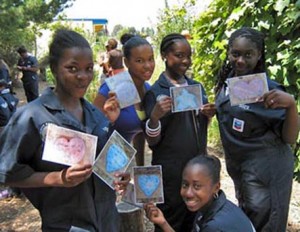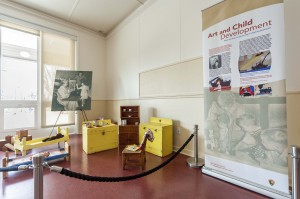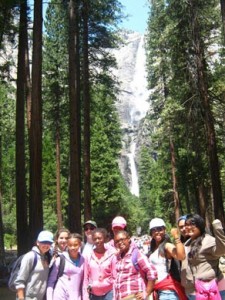Richmond community gets support from Rosie the Riveter Trust
posted on March 27, 2013
By Ginny McPartland
Heritage writer

Rosie’s Girls show off their artwork from summer camp. National Park Service photo
The California city of Richmond, branded for years as a community with poverty issues and high crime rates, is making steady progress toward restoring itself as a Bay Area bright spot. Pick any Richmond success story – Urban Tilth, Main Street Initiative, Healthy Richmond – and you can trace its roots to vibrant community groups who see the city’s potential.
One such group is the Rosie the Riveter Trust, a nonprofit association whose focus is to support the programs of the Rosie the Riveter World War II/Home Front National Historical Park established in 2000.
The trust has collaborated with the national park, the city of Richmond, the YMCA, the state of California Cultural and Historic Endowment, Kaiser Permanente, the Richmond Community Foundation, local labor and business groups and others to bring many projects to fruition since the nonprofit’s creation in 1999.

A corner of the National Park Service child care display in the restored Maritime Child Development Center in Richmond, Calif. Photo by Eric Chiu, Hamilton+ Aitken Architects
Home front stories highlighted
The Rosie Trust raised funds to obtain recognition in 2003 of Atchison Village, a wartime housing project, as a national historic landmark. The community, built for Kaiser Richmond Shipyard workers in 1942, is still thriving as an affordable housing cooperative.
The nonprofit organization helped arrange funding for the $9 million restoration of the wartime Maritime Child Care Center, which now houses a Richmond College Prep preschool, the Richmond Community Foundation and a national park historical display commemorating the progressive child care available to workers in the Kaiser Shipyards during World War II.
The Rosie Trust has helped to develop educational materials to tell the stories of the home front, including the birth of the Kaiser Permanente prepaid health plan in the wartime shipyards, the role women and minorities played in the workforce, and the development of worker safety principles.

Middle school girls from Richmond, California, enjoy a trip to Yosemite National Park as part of six-week summer camp. National Park Service photo
Trust members were integral to the development of the Rosie the Riveter national park Visitor Education Center that opened in 2012 next to the restored Ford Assembly Plant, a popular event venue now called The Craneway. The trust operates the center’s gift shop and book store.
‘Rosie’s Girls’ go to summer camp
For the past four years, the Rosie Trust has supported a six-week working summer camp for Richmond middle school girls who – due to their environment – might take a risky path without guidance. As “Rosie’s Girls,” they spend their summer engaging in activities meant to expose them to positive female role models and to learn traditionally male skills such as carpentry, plumbing, self-defense, and fire fighting.
The camp is free to girls from Richmond neighborhoods that have been designated as disadvantaged. The program has limited space. If interested, contact Lucien Sonder, National Park Service, 510-232-5050.
The camp sponsors include the Rosie Trust, the city of Richmond, the YMCA, the national park and the West Contra Costa County School District, as well as Wells Fargo, Kaiser Permanente East Bay, Safeway Foundation, Chevron, and Mechanics Bank.
Dinner supports park initiatives
The Rosie Trust Board of Directors hosts an annual dinner each spring to raise funds for its various park projects. This year’s event, “Rosies – Then & Now,” will be held Saturday, April 13, in the Craneway Pavilion, 1414 South Harbour Way, Richmond. Cocktails begin at 6 p.m. in the national park visitors’ center; dinner will follow at 7 p.m. in the Craneway Conference Center.
Tickets are $150 per person; sponsorships are available. For more information or to reserve tickets, go to the Rosie the Riveter Trust site and click on “Rosies — Then and Now” or phone the trust office at 510-507-2276.
|

